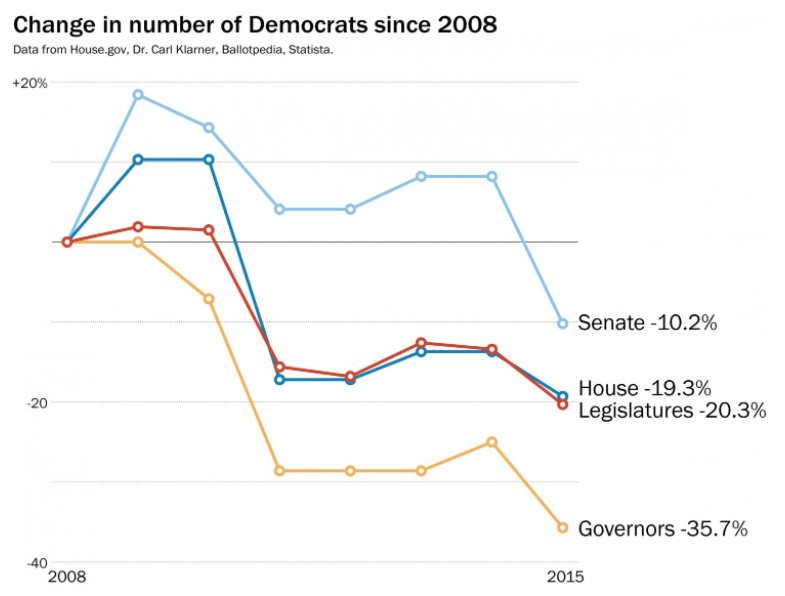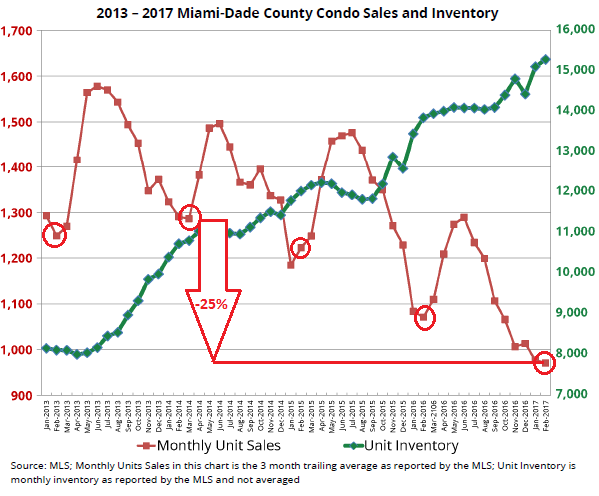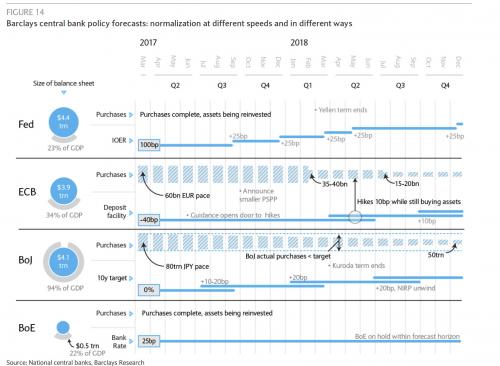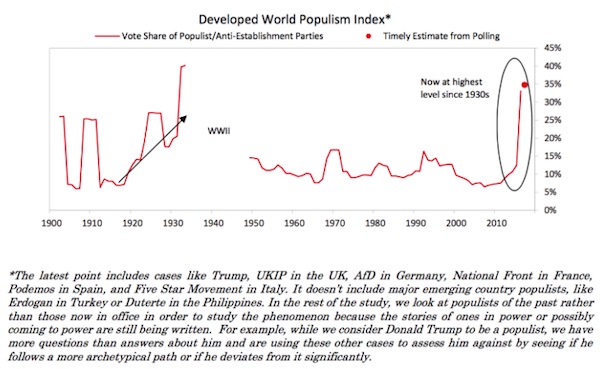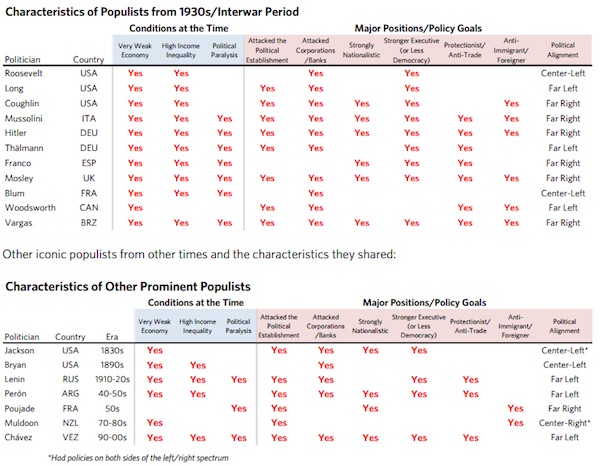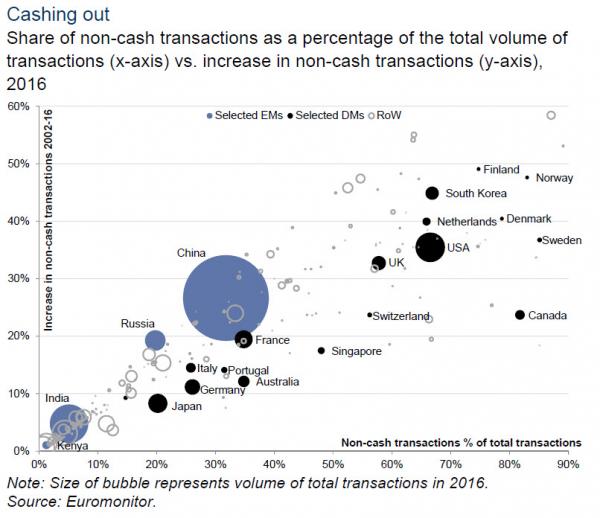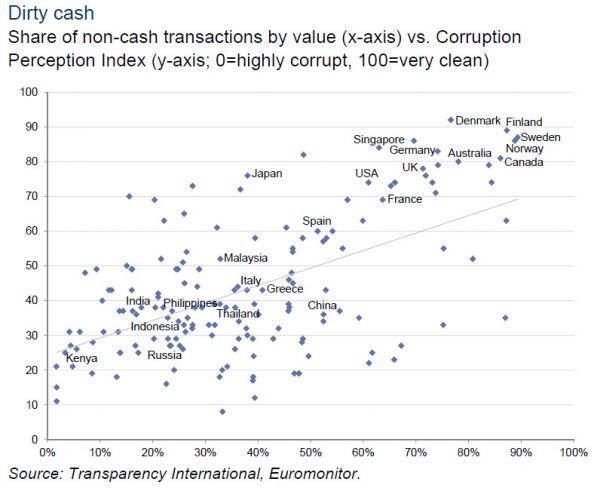
Pablo Picasso Weeping woman 1937

Economy out of balance.
• US Inequality Near Historic Highs, Wages Stagnant (BI)
There is a reason so many Americans feel the economy’s recovery from the Great Recession has not benefited them: It hasn’t. An expansion that began, believe it or not, more than seven years ago has extended a longer-run trend of wage stagnation for the average US worker, despite a sharp drop in the official unemployment rate to 4.4% from an October 2009 peak of 10%. No wonder the recovery seems so lopsided, particularly given economic inequality levels not seen since before the Great Depression. A new report from the Hamilton Project, an economic-policy initiative of the Brookings Institution in Washington, offers a range of startling figures and charts that paints a rather dramatic picture of US economic disparities. “The U.S. economy has experienced long-term real wage stagnation and a persistent lack of economic progress for many workers,” wrote Jay Shambaugh, a White House economist under President Barack Obama who now heads the Hamilton Project.
After adjusting for inflation, wages are just 10% higher in 2017 than they were in 1973, amounting to real annual wage growth of just below 0.2% a year, the report says. [..] One big source of the problem: Starting around the 1970s, US productivity growth began rising much more rapidly than workers’ compensation — meaning the share of growth was accumulating increasingly in corporate profits at the expense of pay. The report attributes this both to the increasing role of technology in the workplace but also to a loss of bargaining power brought on by anti-union labor policies and other wage-suppressing measures. “Changes in worker bargaining power, competition within and across industries, and globalization can all influence the share of output workers receive,” the report said.
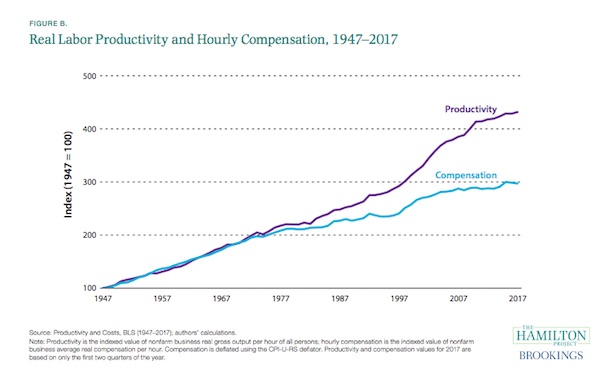

What happened to Auckland?
• UBS Indentifies 8 Cities With Biggest Housing Bubbles (ZH)
Two years ago, when UBS looked at the world’s most expensive housing markets, it found that London and Hong Kong were the only two areas exposed to bubble risk. What a difference just a couple of years makes, because in the latest report by UBS wealth Management, which compiles the bank’s Global Real Estate Bubble Index, it found that eight of the world’s largest cities are now subject to a massive speculative housing bubble. And while perpetually low mortgage rates are clearly to blame for the rapid ascent of home prices, Chinese money laundering operations clearly seem to also be playing a role as their favorite markets of Vancouver, Toronto and Sydney all made this year’s list. Bubble risk seems greatest in Toronto, where it has increased significantly in the last year.
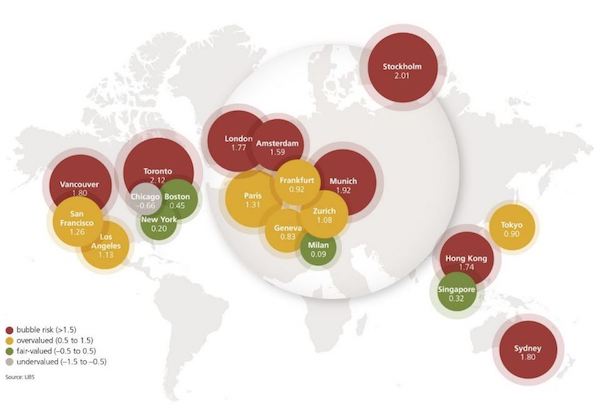
Stockholm, Munich, Vancouver, Sydney, London and Hong Kong all remain in risk territory, with Amsterdam joining this group after being overvalued last year. Valuations are stretched in Paris, San Francisco, Los Angeles, Zurich, Frankfurt, Tokyo and Geneva as well. In contrast, property markets in Boston, Singapore, New York and Milan seem fairly valued, while Chicago remains undervalued, just as it was last year. Price bubbles are a regularly recurring phenomenon in property markets. The term “bubble” refers to a substantial and sustained mispricing of an asset, the existence of which cannot be proved unless it bursts. But recurring patterns of property market excesses are observable in the historical data. Typical signs include a decoupling of prices from local incomes and rents, and distortions of the real economy, such as excessive lending and construction activity. The UBS Global Real Estate Bubble Index gauges the risk of a property bubble on the basis of such patterns.
As UBS points out, artificially low interest rates in Europe, for example, have kept mortgage payments below their 10-year average despite real prices surging 30% since 2007. Falling mortgage rates over the last decade have made buying a home vastly more attractive, which increased average willingness to pay for home ownership. In European cities, for example, the annual usage costs for apartments (mortgage interest payments and amortization) are still below their 10-year average, despite real prices escalating 30% since 2007. In Canada and Australia, too, a large part of the negative impact of higher purchase prices on affordability was cushioned by low mortgage rates.
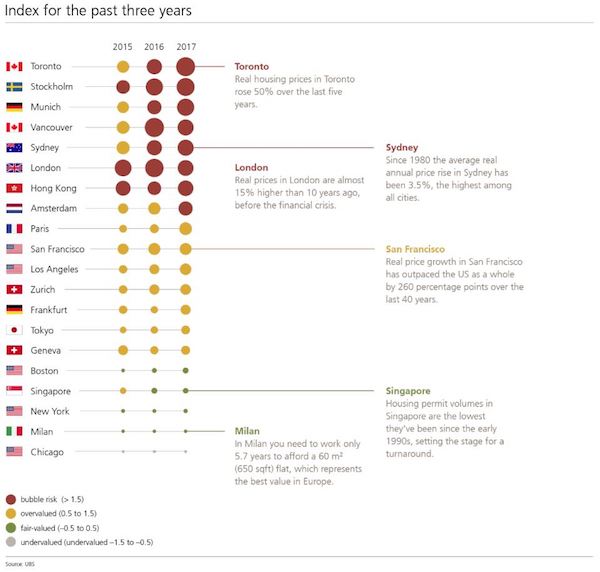

Xi must watch his reserves.
• Chinese Money Is Still Leaking Into the World’s Housing Markets (BBG)
Tighter capital controls have done little to dent the appetite of Chinese buyers who already helped drive prices higher across the globe. While definitive data are hard to come by, real estate brokers including Knight Frank LLP, Savills Plc and domestic firm Shiju report rising purchases of overseas property this year. What’s changed is that the curbs have prompted buyers to look for cheaper homes in smaller cities, making down payments more manageable. Part of the reason for the unhindered overseas purchases could be that authorities have already succeeded in stemming capital outflows after cracking down on the most acquisitive companies. That eases the need to enforce limits on individuals, a more difficult and costly process, said Steven Zhang at Morgan Stanley Huaxin. “It’s a question of cost and benefit,” Zhang said.
Since the start of 2017, Chinese applying for their $50,000-a-year foreign-exchange quotas must sign pledges that the money won’t be used for real estate. Violators face a range of potential sanctions. [..] The impact of the increased currency scrutiny has been on the size rather than the quantity of deals. At real estate portal Juwai.com, the average price of overseas properties Chinese buyers inquired about dropped to just over $292,000 this year from more than $356,000 in 2016. Some buyers are eschewing pricey hubs like New York for less-expensive areas such as Florida and Texas, according to Eric Lam, chief executive of Shiju, the overseas broker unit of Shenzhen World Union Properties. They’re typically spending up to 3 million yuan ($450,000) for U.S. homes, and as much as 2 million yuan for U.K. properties, prices that make for manageable down payments using exchange quotas, Lam said.
Jones Lang LaSalle said it was mainly selling U.K. homes, often below $500,000, and Cushman & Wakefield also highlighted surging Chinese demand for British property after the pound weakened following the Brexit vote. [..] The undimmed appetite suggests Chinese money could continue to put upward pressure on prices, a trend that’s stoked concern among locals in cities from Vancouver to Sydney. Chinese buyers, mainly from the mainland but also from Taiwan and Hong Kong, spent a record $31.7 billion on U.S. residential properties in the year through March 31, remaining the biggest foreign force in the market.
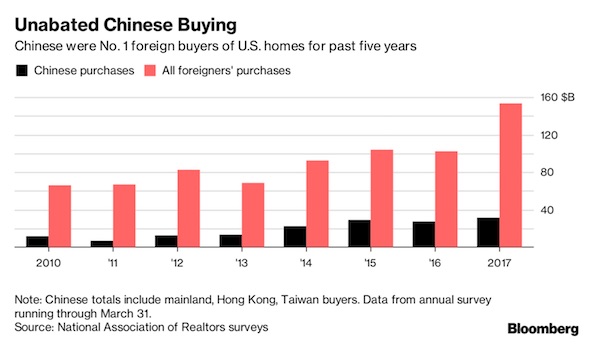

The crackdown doesn’t come into effect until October.
• China’s Bitcoin Market Alive And Well As Traders Defy Crackdown (R.)
Weeks after Beijing banned fundraising through token launches and ordered some bitcoin exchanges to shut, casting a chill over the cryptocurrency industry, traders say that the market is far from dead. While several exchanges have announced that they will close by the end of this month, traders have now moved to buy and sell bitcoin directly with each other on peer-to-peer marketplaces and messenger apps. Industry insiders say some overseas-based initial coin offerings (ICOs) are still being marketed. Although the crackdown has dissuaded large swathes of less-experienced investors from participating in the trade, market participants point to the limits Chinese regulators ultimately face in controlling the industry, where many users are anonymous and difficult to track.
In the short-run, the crackdown has also created an arbitrage opportunity for investors, with the price of bitcoin in China now trading at a discount to overseas exchanges. “They can’t set rules to stop me from investing in what I want to invest in. They say you are protecting me, but as long as I think this is good, they have no way to intervene,” said a Chinese bitcoin investor named Victor, who declined to give his full name citing current sensitivities. [..] “The fact that bitcoin is still being traded is an indication that China isn’t looking to eliminate them, but reposition things in a way to have better control over them,” said Marshall Swatt, the founder of New York-based Coinsetter, a bitcoin exchange acquired by larger peer San Francisco-based Kraken in 2016.
Other Chinese cryptocurrency players said traders were also moving away from using Tencent’s WeChat app, to encrypted messenger app Telegram to avoid regulatory scrutiny. Some said they were still seeing overseas-based ICOs being marketed in China. The Sept. 4 shutdown of ICOs stipulated that Chinese citizens were not allowed to invest in ICOs. Overseas ICOs have been returning money on a voluntary basis.

That’s going to hurt.
• China Orders North Korean Companies Active In The Country To Shut Down (BBG)
China ordered North Korean companies active in the country to shut down as it seeks to implement United Nations’ sanctions against the hermetic regime. Joint ventures between Chinese firms and North Korean entities and individuals will also have to close, according to a statement on the website of China’s Ministry of Commerce Thursday. Companies are required to cease business within 120 days of Sept. 12 – the day after the UN passed new sanctions aimed at punishing North Korea for its latest missile and nuclear tests. Non-profit and non-commercial public utility and infrastructure projects are not subject to the order, the ministry said. The move comes ahead of U.S. Secretary of State Rex Tillerson’s visit to China at the weekend. North Korea is among topics to be discussed with senior Chinese leaders, along with President Donald Trump’s planned trip to the region and trade and investment issues, the State Department said in a statement on Wednesday.

Please keep the peace.
• The Closing Of The Catalan Polling Stations (EI)
As we reported yesterday, the Catalan head prosecutor has instructed the regional police, the Mossos d’Esquadra, to seal the designated polling stations for Sunday’s independence referendum by Friday. This may not be easy. The radical left separatist party CUP is calling for the seals to be broken, and there will be attempts to organise sit-ins at the polling stations before the police comes to seal them, which would force the police to clear the sit-in. As we noted yesterday they are about 2,700 polling stations in a Catalan election, which stretches the police’s ability to cover them all simultaneously. The Mossos have responded officially that they will act proportionately, and that there is a risk that sealing the polling places may lead to public unrest. In addition, they are demanding a court order – not just an instruction from the prosecutor – to seal the polling stations.
The Catalan government says that the police is there to guarantee order so that people can exercise their right to vote, while the Spanish government says the police is there to prevent illegal acts from being carried out. The Catalan premier has convened the region’s public safety board, which includes representatives of the Spanish interior minister who will be in attendance. The interior minister had previously set up security coordination meetings for all the Spanish and Catalan police forces, which the Mossos resent as they result in putting them under command of the national police. We have also reported that Mariano Rajoy will miss tomorrow’s informal EU summit in Tallinn, which starts today with a dinner, ostensibly on account of the Catalan referendum. The referendum is scheduled for Sunday. We wonder whether Mariano Rajoy feels he needs to be in Spain on the Friday just in case unrest breaks out.

Sounds like a lot. The French are serious about wine.
• French Vineyards Robbed Of Seven Tonnes Of Grapes (AFP)
At least seven tonnes of grapes have been stolen in the dead of night from vineyards in France’s prime winegrowing region of Bordeaux, following a disastrous yield blamed on poor weather, police say. Three vineyards have had grapes and even whole vines stolen since mid-September, police said on Wednesday. They said about six and a half tonnes of grapes disappeared from a vineyard in Genissac near the world-famous Saint Emilion region, adding that the theft was clearly committed by professional vintners. Between 600 and 700kg (1,300 and 1,500lb) of grapes were stolen from a vineyard in Pomerol, which produces top quality reds. Thieves also uprooted 500 vines from a vineyard in nearby Montagne, police said.
A fourth grape robbery took place in Lalande-de-Pomerol, according to a local press report. Thieves making away with grapes is not a new phenomenon but it has surged this year apparently because of a very low yield. “There’s a great temptation to help oneself from [the vineyard] next door,” an industry expert told AFP on condition of anonymity. France faces its poorest wine harvest since 1945 after an unusually mild March and frosty April, experts said last month, although a hot summer promises to deliver top vintages. The agriculture ministry said output was expected to total 37.2m hectolitres (983m US gallons), 18% less than 2016 and 17% below the average over the past five years.

Merkel already sold off Greece to please her bankers. Now she’s planning to make things worse in order to cement a coalition.
• Schäuble Leaves But Schäuble-ism Lives On (Varoufakis)
Wolfgang Schäuble may have left the finance ministry but his policy for turning the eurozone into an iron cage of austerity, that is the very antithesis of a democratic federation, lives on. What is remarkable about Dr Schäuble’s tenure was how he invested heavily in maintaining the fragility of the monetary union, rather than eradicating it in order to render the eurozone macro-economically sustainable and resilient. Why did Dr Schäuble aim at maintaining the eurozone’s fragility? Why was he, in this context, ever so keen to maintain the threat of Grexit? The simple answer is: Because a state of permanent fragility was instrumental to his strategy for using the threat of expulsion from the euro (or even of Germany’s withdrawal from it) to discipline the deficit countries – chiefly France.
Deep in Dr Schäuble’ thinking there was the belief that, as a federation is infeasible, the euro is a glorified fixed exchange rate regime. And the only way of maintaining discipline within such a regime was to keep alive the threat of expulsion or exit. But to keep that threat alive, the eurozone could not be allowed to develop the instruments and institutions that would stop it from being fragile. Thus, the eurozone’s permanent fragility was, from Dr Schäuble’s perspective an end-in-itself, rather than a failure. The Free Democratic Party’s ascension will see to it that Wolfgang Schäuble’s departure will not alter the policy of doing whatever it takes to prevent the eurozone‘s evolution into a sustainable macroeconomy.
The FDP’s sole promise to its voters was to prevent any of Emmanuel Macron’s plans, for some federation-lite, from being agreed to, and for pursuing Grexit. Even worse, whereas Wolfgang Schäuble understood that austerity plus new loans were catastrophic for countries like Greece (but insisted on them as part of his campaign to discipline France and Italy), his FDP successors at the finance ministry will probably be less ‘enlightened’ believing that the ‘tough medicine’ is fit for purpose. And so the never ending crisis of Europe’s social economy, that feeds the xenophobic political monsters, continues.

Waterboarding. And worse. Do this to an economy, and it will fail outright. That, then, must be what Berlin is aiming for.
• Over Half Of All Greek Enterprises Are In The Red (K.)
At least 56% of small and medium-sized enterprises (SMEs) are now in debt due to low liquidity and high borrowing, a combination that forbids them from meeting their short-term obligations. Only a fraction have a chance of having their debt restructured, which means that sooner or later they will follow the fate of many of their peers and be forced to shut down. This is the main conclusion of a Piraeus Bank analysis after a sample of 7,896 companies were assessed using its Enterprise Rating System (ERS). Given that over 97% of enterprises in Greece are SMEs, the risk both to them and the economy in general is clear, with an impact on state revenues, employment and bank provisions.
The ERS assessment resulted in four categories of enterprises based on liquidity, solvency, degree of leverage and debt servicing. Just 8.6% of all companies have made it into the A category. They are the healthiest businesses, with high cash flows, even though two-thirds face problems with their earnings. Category B accounts for 35.7% of companies, which display satisfactory performance; however, it should be observed that the obligations of these businesses exceed their assets by 1.2 times. The largest category is C, with two-fifths of all companies, or 40.4%; they are enterprises which have not yet reached the brink as they have some chances at becoming sustainable, but indicate a low degree of debt servicing, finding themselves in the red.
Finally there is category D, which hosts 15.4% of all companies. The vast majority (82.5%) has a substantial problem in terms of sustainability; not only do they have a negative operating profit rate, averaging at -9.1%, but they are also loss-making. The average company in this category has borrowing that is three-and-a-half times its assets and 25 times its earnings before interest, tax, depreciation and amortization (EBITDA).

Lesvos Solidarity on Twitter: “Section C in #moria now houses around 200 unaccompanied minors, incl pregnant girls. They are unattended after 17.00.”
• Surge In Migration To Greece Fuels Misery In Refugee Camps (G.)
Greece is experiencing a dramatic rise in the number of refugees and migrants entering the country, exacerbating already deplorable living conditions on island camps. The number of people arriving, across land and sea borders, has more than doubled since the beginning of the summer. Authorities estimate arrivals are now at their highest level since March 2016, with over 200 men, women and children being registered every day. “It is dramatic and it is the most vulnerable of the vulnerable coming in,” said Elias Pavlopoulos, who heads Médecins sans Frontières in Greece. “There are whole families fleeing war zones in Syria and Iraq. In the last few months our clinics have seen more people who have suffered violence, who are victims of rape, who have been tortured, than ever before.”
Despite a pledge by EU member states in September 2015 to relocate 160,000 asylum seekers – including 106,000 from Greece and Italy – a mere 29,000 have been moved to other European countries so far. With the 28-nation bloc failing to meet the deadline set out in its own plan, mass demonstrations are expected in capitals across Europe this weekend. Refugees and migrants have been arriving in Greece not only on rickety boats from Turkey but by foot across the frontier between the two countries. On Wednesday, police announced 37 refugees – including 19 children – from Iraq, Syria, Eritrea and Afghanistan, had been dumped by smugglers on the national highway outside Thessaloniki.
Human rights groups are increasingly likening the situation to 2015, when, at the height of the migrant crisis that engulfed Europe, Greece saw close to a million people enter the country on onward journeys that often took them to Germany. “We’re living the days of 2015,” said Pantelis Dimitriou from Iliaktida, a local NGO on Lesbos operating accommodation and support centres for the newly arrived. “The flows have become huge. From around 50 to 60 in early July they are now at more than 200 every day. Maybe it is the German elections, maybe it is about Turkey’s [worsening] relations with the EU, or maybe this is the last push before winter, but something is going on.” More worrying is the number of minors making the often treacherous journey to get to Greece. In a statement this week, Save the Children said around 40% of the new arrivals were under the age of 18. Over 1,500 unaccompanied minors are currently on waiting lists in Greece to be housed in child shelters.

We need a global ban on using antibiotics on farms. But the industry is very powerful.
• China’s Love of Meat Is Driving Global Antibiotic Usage (BBG)
Growing global demand for animal protein is good news for the pharmaceutical industry, but a worry for public health. Food animals will consume 200,235 tons of antimicrobial medicines by 2030, 53% more than they were getting in 2013, according to a study published Thursday in the journal Science. China, already the world’s largest consumer of veterinary antimicrobials, is forecast to lead the charge, with a 59% jump. That bodes badly for the efficacy of these infection-fighting medications. The study’s authors linked the quantity of drugs used on farms with the emergence of foodborne bacteria, like Campylobacter and Salmonella harboring antibiotic-resistance genes. Limiting daily meat intake worldwide to the equivalent of one standard fast-food burger per person could reduce global consumption of antimicrobials in food animals by 66%, the researchers said.
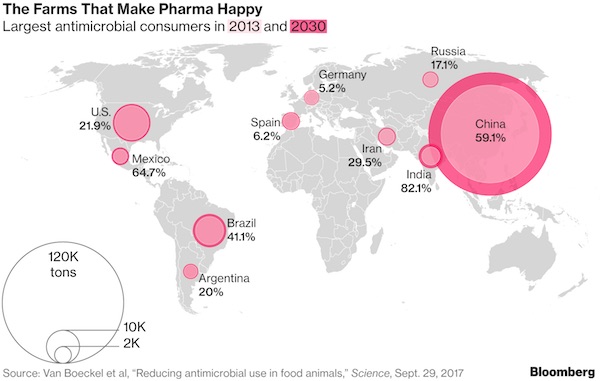

It was fun while it lasted?!
• Tropical Forests Don’t Absorb Carbon. They Emit As Much As All US Transit (Q.)
Since humans began to worry about having put too much carbon in the atmosphere, we’ve considered tropical forests an important “carbon sink.” Their fast growth rate, dense vegetation, and rich soils sucked more carbon out of the atmosphere then they produced. In other words, tropical forests were a natural greenhouse-gas vacuum. Except now, just when the world most needs them to be, they’re not. At some point, it turns out, deforestation, drought, and other forest-disturbing factors tipped the scales, making tropical forests a net producer of carbon rather than a sink, according to a new study published Sept. 28 in the journal Science. Each year, instead of absorbing carbon, these degraded forests are a source of more carbon (roughly 425 teragrams of carbon per year) than an entire year’s worth of US transportation emissions.
Scientists at Woods Hole Research Center and Boston University spent two and a half years trekking to tropical forests in 22 countries, measuring trees’ thickness and recording their growth rate, which is a big factor in how much carbon a forest is absorbing. They then paired their field data with laser remote-sensing data and 12 years of satellite data from NASA’s MODIS satellites. The researcher’s combined approach allowed them to figure out not just losses from dramatic deforestation, but also the harder-to-calculate losses from less obvious factors, like selective logging and small-scale farming. Previous studies have looked at large-scale deforestation in the tropics as a source of carbon, and more recent papers have pointed towards the subtler forms of degradation as a likely underestimated source.



